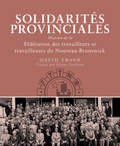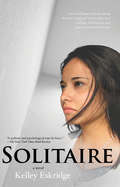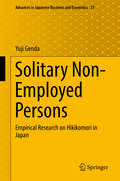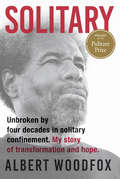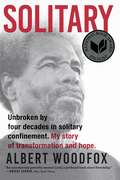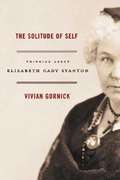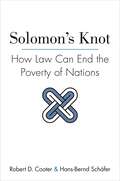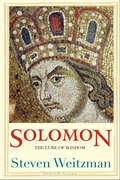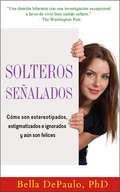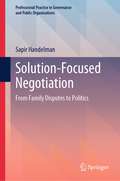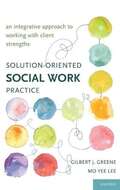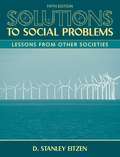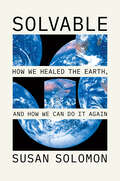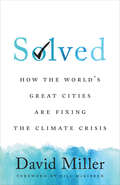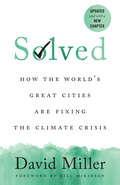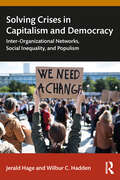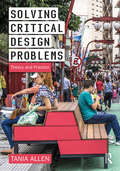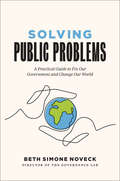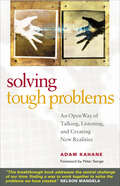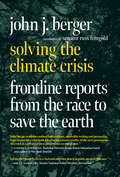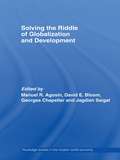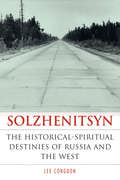- Table View
- List View
Solidarität in Zeiten multipler Krisen: Imperiale Lebensweise und Politische Bildung (Citizenship. Studien zur Politischen Bildung)
by Dirk Lange Ulrich Brand Lara KierotIn diesem Sammelband werden aus unterschiedlichen fachspezifischen, wissenschaftlichen und praktischen Perspektiven vielfältige Aspekte des Themas „Imperiale Lebensweise und Politische Bildung“ beleuchtet und kritisch reflektiert. Die didaktischen Potenziale unterschiedlicher wissenschaftlicher Herangehensweisen und Praxiserfahrungen werden vorgestellt und theoretische Überlegungen sowie empirische Erkenntnisse zum Schwerpunktthema präsentiert.
Solidarités provinciales: Histoire de la Fédération des travailleurs et travailleuses du Nouveau-Brunswick
by David Frank Réjean OuelletteLa Fédération des travailleurs et travailleuses du Nouveau-Brunswick, fondée en 1913, est la deuxième plus ancienne fédération provinciale du travail au Canada. Son histoire remonte aux premières campagnes en faveur de l’indemnisation des accidents du travail et de la reconnaissance syndicale, et elle se poursuit dans les plus récentes luttes visant à défendre les normes sociales et à protéger les emplois et les droits syndicaux. La Fédération a vu le jour dans la ville portuaire de Saint John et le centre ferroviaire de Moncton, puis elle s’est étendue aux travailleurs des mines et des usines du nord de la province, soutenant la cause des employés du secteur public et des travailleuses, reflétant les réalités de la vie et du travail dans une société bilingue. Puisant dans les archives, les journaux et les expériences des travailleurs et des travailleuses, voici l’histoire inédite de solidarités syndicales provinciales qui ont surmonté les divisions et les revers afin de rehausser le statut des travailleurs et des travailleuses dans la société néo-brunswickoise. Par cette étude pionnière rédigée dans un style clair et puissant, Frank apporte une contribution originale à la compréhension de l’évolution politique, économique et sociale de la province, et il aide à combler le besoin d’éclairer la connaissance que le public a de l’histoire des travailleurs et des syndicats de toutes les régions du Canada.
Solitaire
by Kelley EskridgeA New York Times Notable Book, Borders Original Voices selection, and Nebula, Endeavour, and Spectrum Award finalist."Suspenseful and inspiring."-School Library Journal"A stylistic and psychological tour de force."-The New York Times Book ReviewThere are many books we'd love to see back in print and we're very happy to have acquired Kelley Eskridge's debut novel, Solitaire. Jackal Segura is a Hope: born to responsibility and privilege as a symbol of a fledgling world government. Soon she'll become part of the global administration, sponsored by the huge corporation that houses, feeds, employs, and protects her and everyone she loves. Then, just as she discovers that everything she knows is a lie, she becomes a pariah, a murderer: a person with no community and no future. Grief-stricken and alone, she is put into an experimental program designed to inflict the experience of years of solitary confinement in a few short months: virtual confinement in a sealed cell within her own mind. Afterward, branded and despised, she returns to a world she no longer knows. Struggling to make her way, she has a chance to rediscover her life, her love, and her soul-in a strange place of shattered hopes and new beginnings called Solitaire.Kelley Eskridge (kelleyeskridge.com) is a novelist, essayist, and screenwriter. Her stories have received the Astraea Award and been adapted for television. A movie based on Solitaire is in development. She lives in Seattle with her partner, novelist Nicola Griffith.
Solitary Non-Employed Persons: Empirical Research on Hikikomori in Japan (Advances in Japanese Business and Economics #23)
by Yuji GendaThis book is devoted to offering a new concept of non-employment caused by social exclusion. Among labor economic studies, it is the first attempt to investigate the conditions of jobless persons who have completely lost opportunities for daily communication with others. The new concept provided by this book is “solitary non-employed persons (SNEP).” SNEP are defined as non-employed persons who are normally entirely alone or do not spend time with people other than their family. According to a detailed time-use survey in Japan, SNEP make up almost 70 % of single, jobless persons aged 20 to 59. The number of SNEP doubled in the 2000s. As a serious issue for non-employment, economists and sociologists have focused on long-term unemployed persons and persons “not in education, employment, or training” (NEET), which include discouraged persons resigning from work. These serious non-employment issues are attributable to and further aggravated by the isolation experienced by the SNEP. Social withdrawal—that is, the hikikomori who stay indoors—is one notable feature of Japanese youth problems in many cases. Large numbers of the middle-aged jobless Japanese also currently shut themselves in their rooms. The objective approach by the SNEP concept enables us to understand the reality of these withdrawn persons who are now growing in number in many countries. A continuous increase in the number of SNEP will cause several difficulties in society and the economy. SNEP will not make their own livings after the deaths of their families, causing social security costs and financial deficits to further accumulate in the efforts to help them. A shortage of an attractive labor force will accelerate in the future due to the expansion of SNEP within the young and middle-aged populations. This book proposes appropriate policies to prevent an increase in SNEP in such a way as to generate skilled professionals, as well as to reach out and support them. It will contribute to developing studies for jobless people closely involved in social exclusion, and to finding universal and effective solutions for their inclusion.
Solitary: Unbroken By Four Decades In Solitary Confinement. My Story Of Transformation And Hope
by Albert WoodfoxSolitary is the unforgettable life story of a man who served more than four decades in solitary confinement―in a 6-foot by 9-foot cell, 23 hours a day, in notorious Angola prison in Louisiana―all for a crime he did not commit. <P><P>That Albert Woodfox survived was, in itself, a feat of extraordinary endurance against the violence and deprivation he faced daily. That he was able to emerge whole from his odyssey within America’s prison and judicial systems is a triumph of the human spirit, and makes his book a clarion call to reform the inhumanity of solitary confinement in the U.S. and around the world. <P><P>Arrested often as a teenager in New Orleans, inspired behind bars in his early twenties to join the Black Panther Party because of its social commitment and code of living, Albert was serving a 50-year sentence in Angola for armed robbery when on April 17, 1972, a white guard was killed. Albert and another member of the Panthers were accused of the crime and immediately put in solitary confinement by the warden. <P><P>Without a shred of actual evidence against them, their trial was a sham of justice that gave them life sentences in solitary. Decades passed before Albert gained a lawyer of consequence; even so, sixteen more years and multiple appeals were needed before he was finally released in February 2016. <P><P>Remarkably self-aware that anger or bitterness would have destroyed him in solitary confinement, sustained by the shared solidarity of two fellow Panthers, Albert turned his anger into activism and resistance. <P><P>The Angola 3, as they became known, resolved never to be broken by the grinding inhumanity and corruption that effectively held them for decades as political prisoners. He survived to give us Solitary, a chronicle of rare power and humanity that proves the better spirits of our nature can thrive against any odds.
Solitary: Unbroken By Four Decades In Solitary Confinement. My Story Of Transformation And Hope
by Albert WoodfoxFINALIST FOR THE PULITZER PRIZE IN GENERAL NONFICTIONFINALIST FOR THE NATIONAL BOOK AWARD IN NONFICTIONNamed One of Barack Obama’s Favorite Books of 2019Named the Louisiana Endowment for the Humanities Book of the YearNamed a Best Book of the Year by the New York Times, the Washington Post, NPR, Publishers Weekly, BookBrowse, and Literary HubWinner of the BookBrowse Award for Best Debut of 2019A New York Times Book Review Editors’ ChoiceSolitary is the unforgettable life story of a man who served more than four decades in solitary confinement?in a 6-foot by 9-foot cell, 23 hours a day, in notorious Angola prison in Louisiana?all for a crime he did not commit. That Albert Woodfox survived was, in itself, a feat of extraordinary endurance against the violence and deprivation he faced daily. That he was able to emerge whole from his odyssey within America’s prison and judicial systems is a triumph of the human spirit, and makes his book a clarion call to reform the inhumanity of solitary confinement in the U.S. and around the world.Arrested often as a teenager in New Orleans, inspired behind bars in his early twenties to join the Black Panther Party because of its social commitment and code of living, Albert was serving a 50-year sentence in Angola for armed robbery when on April 17, 1972, a white guard was killed. Albert and another member of the Panthers were accused of the crime and immediately put in solitary confinement by the warden. Without a shred of actual evidence against them, their trial was a sham of justice that gave them life sentences in solitary. Decades passed before Albert gained a lawyer of consequence; even so, sixteen more years and multiple appeals were needed before he was finally released in February 2016.Remarkably self-aware that anger or bitterness would have destroyed him in solitary confinement, sustained by the shared solidarity of two fellow Panthers, Albert turned his anger into activism and resistance. The Angola 3, as they became known, resolved never to be broken by the grinding inhumanity and corruption that effectively held them for decades as political prisoners. He survived to give us Solitary, a chronicle of rare power and humanity that proves the better spirits of our nature can thrive against any odds.
Solitary: Unbroken by Four Decades in Solitary Confinement. My Story of Transformation and Hope
by Albert WoodfoxSolitary is the unforgettable life story of a man who served more than four decades in solitary confinement in a 6-foot by 9-foot cell, 23 hours a day, in notorious Angola prison in Louisiana, all for a crime he did not commit. That Albert Woodfox survived was, in itself, a feat of extraordinary endurance against the violence and deprivation he faced daily. That he was able to emerge whole from his odyssey within America’s prison and judicial systems is a triumph of the human spirit, and makes his book a clarion call to reform the inhumanity of solitary confinement in the U.S. and around the world. Arrested often as a teenager in New Orleans, inspired behind bars in his early twenties to join the Black Panther Party because of its social commitment and code of living, Albert was serving a 50-year sentence in Angola for armed robbery when on April 17, 1972, a white guard was killed. Albert and another member of the Panthers were accused of the crime and immediately put in solitary confinement by the warden. Without a shred of actual evidence against them, their trial was a sham of justice that gave them life sentences in solitary. Decades passed before Albert gained a lawyer of consequence; even so, sixteen more years and multiple appeals were needed before he was finally released in February 2016. Remarkably self-aware that anger or bitterness would have destroyed him in solitary confinement, sustained by the shared solidarity of two fellow Panthers, Albert turned his anger into activism and resistance. The Angola 3, as they became known, resolved never to be broken by the grinding inhumanity and corruption that effectively held them for decades as political prisoners. He survived to give us Solitary, a chronicle of rare power and humanity that proves the better spirits of our nature can thrive against any odds.
Solitude of Self: Thinking About Elizabeth Cady Stanton
by Vivian GornickA champion of the women's movement of the 1970s, Gornick reviews the life of one of the 19th-century founders of the movement for women's rights. For more than 50 years Elizabeth Cady Stanton battled for equal rights for women, educating, inspiring, and organizing women across the country. Gornick looks at parallels between the movements and draws upon her own life and evolution as a feminist.
Solomon's Knot: How Law Can End the Poverty of Nations (The Kauffman Foundation Series on Innovation and Entrepreneurship #9)
by Robert D. Cooter Hans-Bernd SchäferWhy law is critical to innovation and economic growthSustained growth depends on innovation, whether it's cutting-edge software from Silicon Valley, an improved assembly line in Sichuan, or a new export market for Swaziland's leather. Developing a new idea requires money, which poses a problem of trust. The innovator must trust the investor with his idea and the investor must trust the innovator with her money. Robert Cooter and Hans-Bernd Schäfer call this the "double trust dilemma of development." Nowhere is this problem more acute than in poorer nations, where the failure to solve it results in stagnant economies.In Solomon's Knot, Cooter and Schäfer propose a legal theory of economic growth that details how effective property, contract, and business laws help to unite capital and ideas. They also demonstrate why ineffective private and business laws are the root cause of the poverty of nations in today's world. Without the legal institutions that allow innovation and entrepreneurship to thrive, other attempts to spur economic growth are destined to fail.
Solomon: The Lure of Wisdom
by Steven WeitzmanTradition has it that King Solomon knew everything there was to know--the mysteries of nature, of love, of God himself--but what do we know of him? Esteemed biblical scholar Steven Weitzman reintroduces readers to Solomon's story and its surprising influence in shaping Western culture, and he also examines what Solomon's life, wisdom, and writings have come to mean for Jews, Christians, and Muslims over the past two thousand years. Weitzman's Solomon is populated by a colorful cast of ambitious characters--Byzantine emperors, explorers, rabbis, saints, scientists, poets, archaeologists, trial judges, reggae singers, and moviemakers among them--whose common goal is to unearth the truth about Solomon's life and wisdom. Filled with the Solomonic texts of the Bible, along with lesser-known magical texts and other writings, this book challenges both religious and secular assumptions. Even as it seeks to tell the story of ancient Israel's greatest ruler, this insightful book is also a meditation on the Solomonic desire to know all of life's secrets, and on the role of this desire in world history.
Solteros señalados: cómo son estereotipados, estigmatizados e ignorados y aún son felices
by Bella DePauloSolteros señalados estableció a Bella DePaulo como la "principal intelectual y escritora de Estados Unidos sobre la experiencia de ser soltero". Utiliza la investigación científica, la cultura popular, y las experiencias de personas solteras para revelar las historias de éxito jamás contadas de personas solteras. Sí, es cierto que los solteros son estereotipados y estigmatizados. Pero no son víctimas. La autora, quien posee un doctorado en Harvard, observa los estudios sobre los solteros y descubre que los estereotipos, como por ejemplo, que son infelices, solitarios y egoístas, son sólo mitos. Solteros señalados incluye capítulos sobre mujeres, hombres, padres y ancianos solteros. También hay capítulos en los que se desacreditan varios mitos sobre ellos. En la introducción, DePaulo describe el lugar importante del soltero en la sociedad contemporánea. Casi la mitad de los estadounidenses adultos no están casados (son divorciados, viudos o siempre han sido solteros) y la edad en la que la gente se casa (entre los que lo hacen) ha estado aumentando casi cada año. Solteros señalados ha sido analizado en los periódicos y revistas más prestigiosos de los Estados Unidos y alrededor del mundo. Bella DePaulo ha aparecido en televisión nacional e internacional y en programas de radio. (Para ver su biografía y la sección de medios, entre a este link http://belladepaulo.com/singles-research-and-writing/#5.) Los capítulos de Solteros señalados a menudo son asignados en los cursos universitarios. El libro fue escrito con los altos estándares de una científica social consumada, y el ingenio de una buena escritora. The Washington Post lo describió como una “diatriba hilarante con una investigación excepcional a favor de vivir bien siendo soltero.” Otro de los periódicos principales comentó, "Fascinante. Este libro no podría haber llegado en un mejor momento. Por más que la adulación social de la pareja discrimine
Solution-Focused Negotiation: From Family Disputes to Politics (Professional Practice in Governance and Public Organizations)
by Sapir HandelmanThis book is about an intensive form of peacemaking interaction, in which the disputing parties agree to take time out from the routine of their daily life in order to negotiate solutions to their conflict. The interaction has rules, structure and a time frame. This book is a social instrument for finding practical and enforceable solutions to conflicts in a limited time frame. Most people experience conflicts in their daily, professional and political life. They tend to avoid dealing with these conflicts, even when doing so causes them a great deal of suffering. This book was written to introduce a powerful mechanism for conflict resolution - Solution-Focused Negotiation. Dr. Sapir Handelman has led, directly and indirectly, dozens of face-to-face and online Solution-Focused Negotiations. Dr. Handelman, his colleagues and students have helped many people to successfully resolve their conflicts. The cases presented here reflect tensions, frictions and struggles in nearly all dimensions of social life, from family disputes to politics. The goal of this book is to share this knowledge, experience and expertise with scholars, practitioners and the general public.
Solution-oriented Social Work Practice: An Integrative Approach To Working With Client Strengths
by Mo Yee Lee Gilbert J. GreeneToo often in practice, there is a tendency to pathologize clients, requiring a diagnosis as part of the helping relationship. Suppose, however, that most of the client problems that social workers encounter have more to do with the vagaries of life and not with what clients are doing wrong. This powerful idea is the philosophy behind the strengths-based approaches to social work. This groundbreaking practice handbook takes this concept one step further, combining the different strengths-based approaches into an overarching model of solution-oriented social work for greater impact. The strengths perspective emphasizes client strengths, goal-setting, and a shared definition of positive outcome. Solution-focused therapy approaches ongoing problems when they have temporarily abated, amplifying exceptions as solutions. This natural but rarely explored pairing is one component in the challenging and effective practice framework presented here by the authors, two seasoned practitioners with over 50 years of combined experience. By integrating the most useful aspects of the major approaches, a step-by-step plan for action emerges. With this text in hand, you will: - Integrate elements from the strengths perspective, solution-focused therapy, narrative therapy, and the strategic therapy of the Mental Research Institute (the MRI approach) into an effective and eclectic framework - Build and practice your skills using case examples, transcripts, and practical advice - Equip yourself with the tools you need to emphasize clients' strengths - Challenge the diagnosis-first medical model of behavioral health care - Collaborate with clients to get past thinking (first-order change), and more to acting "outside the box" (second-order change) - Learn to work with a wide variety of clients, including individuals, groups, and families; involuntary clients; clients with severe mental illness; and clients in crisis For any student or practitioner interested in working with clients towards collaborative and empowering change, this is the essential text.
Solutions to Political Polarization in America
by Nathaniel PersilyPolitical polarization dominates discussions of contemporary American politics. Despite widespread agreement that the dysfunction in the political system can be attributed to political polarization, commentators cannot come to a consensus on what that means. The coarseness of our political discourse, the ideological distance between opposing partisans, and, most of all, an inability to pass much-needed and widely supported policies all stem from the polarization in our politics. This volume assembles several top analysts of American politics to focus on solutions to polarization. The proposals range from constitutional change to good-government reforms to measures to strengthen political parties. Each tackles one or more aspects of America's polarization problem. This book begins a serious dialogue about reform proposals to address the obstacles that polarization poses for contemporary governance.
Solutions to Social Problems: Lessons From Other Societies
by D. Stanley EitzenThis reader examines how other advanced industrial societies have dealt with social problems with relative success and looks how these strategies may be applicable to the United States. For each social problem considered, several articles have been selected. These articles either describe the situation in a single country or in multiple countries, or expressly contrast the situation of a country or countries with the United States.
Solvable: How We Healed the Earth, and How We Can Do It Again
by Susan SolomonA compelling and pragmatic argument: solutions to yesterday’s environmental problems reveal today’s path forward. We solved planet-threatening problems before, Susan Solomon argues, and we can do it again. Solomon knows firsthand what those solutions entail. She first gained international fame as the leader of an expedition to Antarctica in 1986, making discoveries that were key to healing the damaged ozone layer. She saw a path—from scientific and public awareness to political engagement, international agreement, industry involvement, and effective action. Solomon, an atmospheric scientist and award-winning author, connects this career-defining triumph to the inside stories of other past environmental victories—against ozone depletion, smog, pesticides, and lead—to extract the essential elements of what makes change possible. The path to success begins when an environmental problem becomes both personal and perceptible to the general public. Lawmakers, diplomats, industries, and international agencies respond to popular momentum, and effective change takes place in tandem with consumer pressure when legislation and regulation yield practical solutions. Healing the planet is a long game won not by fear and panic but by the union of public, political, and regulatory pressure. Solvable is a book for anyone who has ever despaired about the climate crisis. As Solomon reminds us, doom and gloom get us nowhere, and idealism will only take us so far. The heroes in these stories range from angry mothers to gang members turned social activists, to upset Long Island birdwatchers to iconoclastic scientists (often women) to brilliant legislative craftsmen. Solomon’s authoritative point of view is an inspiration, a reality check, a road map, and a much-needed dose of realism. The problems facing our planet are Solvable. Solomon shows us how.
Solved: How the World’s Great Cities Are Fixing the Climate Crisis
by David MillerIf our planet is going to survive the climate crisis, we need to act rapidly. Taking cues from progressive cities around the world, including Los Angeles, New York, Toronto, Oslo, Shenzhen, and Sydney, this book is a summons to every city to make small but significant changes that can drastically reduce our carbon footprint. We cannot wait for national governments to agree on how to reduce greenhouse gas emissions and manage the average temperature rise to within 1.5 degrees. In Solved, David Miller argues that cities are taking action on climate change because they can – and because they must. Miller makes a clear-eyed and compelling case that, if replicated at pace and scale, the actions of leading global cities point the way to creating a more sustainable planet. Solved: How the World’s Great Cities Are Fixing the Climate Crisis demonstrates that the initiatives cities have taken to control the climate crisis can make a real difference in reducing global emissions if implemented worldwide. By chronicling the stories of how cities have taken action to meet and exceed emissions targets laid out in the Paris Agreement, Miller empowers readers to fix the climate crisis. As much a "how to" guide for policymakers as a work for concerned citizens, Solved aims to inspire hope through its clear and factual analysis of what can be done – now, today – to mitigate our harmful emissions and pave the way to a 1.5-degree world.
Solved: How the World’s Great Cities Are Fixing the Climate Crisis
by David MillerIf our planet is going to survive the climate crisis, we need to act rapidly. Taking cues from progressive cities around the world, including Los Angeles, New York, Toronto, Oslo, Shenzhen, and Sydney, this book is a summons to every city to make small but significant changes that can drastically reduce our carbon footprint. We cannot wait for national governments to agree on how to reduce greenhouse gas emissions and manage the average temperature rise to within 1.5 degrees. In Solved, David Miller argues that cities are taking action on climate change because they can – and because they must. The updated paperback edition of Solved: How the World’s Great Cities Are Fixing the Climate Crisis demonstrates that the initiatives cities have taken to control the climate crisis can make a real difference in reducing global emissions if implemented worldwide. By chronicling the stories of how cities have taken action to meet and exceed emissions targets laid out in the Paris Agreement, Miller empowers readers to fix the climate crisis. As much a “how to” guide for policymakers as a work for concerned citizens, Solved aims to inspire hope through its clear and factual analysis of what can be done – now, today – to mitigate our harmful emissions and pave the way to a 1.5-degree world.
Solving Crises in Capitalism and Democracy: Inter-Organizational Networks, Social Inequality, and Populism
by Jerald Hage Wilbur C. HaddenDemocratic capitalism is beset with many problems producing rising inequality and growing authoritarianism. Examples include homelessness, food insecurity, child poverty, mass killings, and rising antisemitism. These problems encourage the election of authoritarian leaders. This book describes new strategies to promote inclusion and reduce inequality that do not require D.E.I. policies or affirmative action, reduce government spending without wholesale firings and in the process make government more effective, and reduce individual distrust while increasing people’s willingness to donate time and money to important causes that help others and the world.The new strategies create systematic coordinated inter-organizational networks or SCIONs to achieve the following four objectives: Increase the amount and radicalness of product or service innovation Create a more diverse labor force with more and more varied skills Make health and welfare programs more efficient and effective Restore the balance between law and freedom in community safety As a new mode of coordination, SCIONs provide to platforms for continued dialogue among diverse viewpoints, decentralize problem solving, and stimulate considerable organizational adaptiveness. They overcome the limitations of market and state coordination.This macro sociological theory offers policy guidelines that might lead to future jobs for sociologists, provide tools to overcome managerial satisficing, and speed responses to change. A detailed case study is provided with a discussion of the feasibility of creating SCIONs and whether or not elites will resist this new coordination mode. Given the broad range of topics, this book is relevant for many courses in the social sciences, for those interested in policy and social change, as well as the general public.
Solving Critical Design Problems: Theory and Practice
by Tania AllenSolving Critical Design Problems demonstrates both how design is increasingly used to solve large, complex, modern-day problems and, as a result, how the role of the designer continues to develop in response. With 13 case studies from various fields, including program and product design, Tania Allen shows how types of design thinking, such as systems thinking, metaphorical thinking, and empathy, can be used together with methods, such as brainstorming, design fiction, and prototyping. This book helps you find ways out of your design problems by giving you other ways to look at your ideas, so that your designs make sense in their setting. Solving Critical Design Problems encourages a design approach that challenges assumptions and allows designers to take on a more critical and creative role. With over 100 images, this book will appeal to students in design studios, industrial and product design, as well as landscape and urban design.
Solving Public Problems: A Practical Guide to Fix Our Government and Change Our World
by Beth Simone NoveckHow to take advantage of technology, data, and the collective wisdom in our communities to design powerful solutions to contemporary problems The challenges societies face today, from inequality to climate change to systemic racism, cannot be solved with yesterday&’s toolkit. Solving Public Problems shows how readers can take advantage of digital technology, data, and the collective wisdom of our communities to design and deliver powerful solutions to contemporary problems. Offering a radical rethinking of the role of the public servant and the skills of the public workforce, this book is about the vast gap between failing public institutions and the huge number of public entrepreneurs doing extraordinary things—and how to close that gap. Drawing on lessons learned from decades of advising global leaders and from original interviews and surveys of thousands of public problem solvers, Beth Simone Noveck provides a practical guide for public servants, community leaders, students, and activists to become more effective, equitable, and inclusive leaders and repair our troubled, twenty-first-century world.
Solving Tough Problems: An Open Way of Talking, Listening, and Creating New Realities
by Adam Kahane&“This breakthrough book addresses the central challenge of our time: finding a way to work together to solve the problems we have created.&” —Nelson Mandela Adam Kahane has worked on some of the toughest, most complex problems in the world. He started out as an expert analyst and advisor to corporations and governments, convinced of the need to calculate &“the one right answer.&” After an unexpected experience in South Africa during the transition away from apartheid, he got involved in facilitating a series of extraordinary high-conflict, high-stakes problem-solving efforts: in Colombia during the civil war, in Argentina during the collapse, in Guatemala after the genocide, in Israel, Northern Ireland, Cyprus, and the Basque Country. Through these experiences, he learned to create environments that enable new ideas and creative solutions to emerge even in the most stuck, polarized contexts. Here Kahane tells his stories and distills from them an approach all of us can use to solve our own toughest problems—at home, at work, in our communities, and in national and international affairs. &“Thought-provoking (occasionally verging on spiritual) discourse on handling difficult situations gracefully, productively and calmly.&” —Publishers Weekly &“Many people have written about the healing power of dialogue. None, however, has put that power to the test under more extreme conditions with greater success than Adam Kahane. Informative, inspiring, and beautifully written.&” —David Korten, President of the People-Centered Development Forum, and author of When Corporations Rule the World &“This generative dialogue approach offers real opportunities for governments to engage with stakeholders to build trust and create exciting new resolutions to multi-faceted social and governance challenges.&” —Clare Beckton, Assistant Deputy Attorney General of Canada
Solving the Climate Crisis: Frontline Reports from the Race to Save the Earth
by John J. BergerGroundbreaking solutions to the climate crisis from scientists, engineers, civic leaders, entrepreneurs and activists, offering hope to all readers concerned about our planet's future.Offers practical actions that reflect technological and economic advances with an introduction by former United States senator Russ Feingold.Solving the Climate Crisis is a hopeful and critical resource that makes a convincing and detailed case that there is a path forward to save our environment. Illustrating the power of committed individuals and the necessity for collaborative government and private-sector climate action, the book focuses on three essential areas:The technological dimension: move to 100% clean renewable energy as fast as we possibly can through innovations like clean-steel, &“green&” cement, and carbon-reuse companies;The ecological dimension: enhance and protect natural ecosystems, forests, and agricultural lands to safely store greenhouse gases and restore soils, transforming how we grow, process, and consume food;The social dimension: update and create new laws, policies and economic measures to recenter human values and reduce environmental and social injustice.Based on more than 6 years of research, Berger traveled the nation and abroad to interview governors, mayors, ranchers, scientists, engineers, business leaders, energy experts, and financiers as well as carbon farmers, solar and wind innovators, forest protectors, non-profit leaders, and activists.With real world examples, an explanation of cutting-edge technologies in solar and wind, and political organizing tactics, Solving the Climate Crisis provides a practical road map for how we effectively combat climate change. Replacing the fossil-fuel system with a newly invigorated, modernized, clean-energy economy will produce tens of millions of new jobs and save trillions of dollars. Protecting the climate is thus potentially the greatest economic opportunity of our time.
Solving the Riddle of Globalization and Development (Routledge Studies in the Modern World Economy)
by David E. Bloom Manuel R. Agosín Georges Chapelier Jagdish SaigalIn the past two decades many developing countries have embraced the challenge of globalization by rushing to dismantle trade barriers and to promote increasingly liberal market-oriented policies. However, a broader response to globalization is both necessary and possible if countries are to develop as quickly and as fully as possible. Exploring this complex interrelationship between globalization, liberalization, and human and social development, this innovative book undertakes a full analysis of development policy, strategy and practice in a variety of countries, with equal weight provided to Asia, Latin America and Africa. An internationally renowned team of contributors examines the complex network of connections and the implications for international development policy, strategy and practice. Advocating the inclusion of sustainable human development as a key element in countries' responses to globalization, key points highlighted include the need to nurture an enabling environment, and to promote education and R&D. These elements, coupled with sound macroeconomic management, are all required in equipping a country to integrate more effectively into the world economy. This innovative new approach to globalization and development set out in this volume will be essential reading for academics and practitioners alike.
Solzhenitsyn: The Historical-Spiritual Destinies of Russia and the West (NIU Series in Slavic, East European, and Eurasian Studies)
by Lee CongdonThis study of Aleksandr Solzhenitsyn (1918–2008) and his writings focuses on his reflections on the religiopolitical trajectories of Russia and the West, understood as distinct civilizations. What perhaps most sets Russia apart from the West is the Orthodox Christian faith. The mature Solzhenitsyn returned to the Orthodox faith of his childhood while serving an eight-year sentence in the GULag Archipelago. He believed that when men forget God, communism or a similar catastrophe is likely to be their fate. In his examination of the author and his work, Lee Congdon explores the consequences of the atheistic socialism that drove the Russian revolutionary movement. Beginning with a description of the post-revolutionary Russia into which Solzhenitsyn was born, Congdon outlines the Bolshevik victory in the civil war, the origins of the concentration camp system, and the Bolsheviks' war on Christianity and the Russian Orthodox Church. He then focuses on Solzhenitsyn's arrest near the war's end, his time in the labor camps, and his struggle with cancer. Congdon describes his time in exile and increasing alienation from the Western way of life, as well as his return home and his final years. He concludes with a reminder of Solzhenitsyn's warning to the West—that it was on a path parallel to that which Russia had followed into the abyss. This important study will appeal to scholars and educated general readers with an interest in Solzhenitsyn, Russia, Christianity, and the fate of Western civilization.

